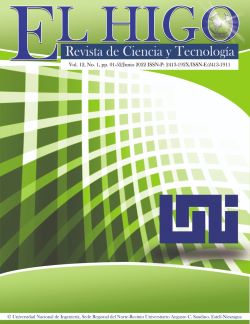Scenarios and academic processes in which they have been developed Investigations of monographic works, students of the career of Agroindustrial Engineering at the UNI Norte headquarters, period 2010-2019
DOI:
https://doi.org/10.5377/elhigo.v12i1.14537Keywords:
Value chains, research projects, graduates, skills developedAbstract
With the objective of analyzing the scenarios and academic processes in which the research carried out by the graduates of the Agroindustrial Engineering career has been developed, from 2010 to May 2019, a descriptive, correlational and analytical study was carried out. under the socio-critical paradigm with a mixed approach of qualitative and quantitative research methods. The investigations have been carried out mainly in the department of Estelí, in the coffee and dairy value chains, associated with process control, industrial processes, SMEs, family businesses and business groups. They are characterized by being experimental and descriptive oriented to the diagnosis of CP and characterization of the study subject. With a tendency to be linked to research projects carried out by the university and 11% to internships carried out in companies. The academic processes linked to the studies are the four subjects of the research axis and the practices carried out in the third and fourth year of the degree. It has allowed graduates to develop skills such as: teamwork, data collection and data processing skills.
Downloads
References
Arias, F. (2012). El proyecto de Investigación. Introducción a la metodología científica. Caracas - república Bolivariana de Venezuela: Episteme, C.A, p. 22.
Campanario, J., Cabos, W. y Hidalgo, M. (1998). El impacto de la producción científica de la Universidad de Alcalá de Henares. Revista española de Documentación Científica, 21(4), 402-415.
Campi, I., Campi, J. y Coloma, L. (2012). Impacto de la Investigación científica en la formación de los estudiantes. Ambato, provincia de Tungurahua: I Congreso Científico Internacional de la Universidad Regional Autónoma de los Andes ''UNIANDES".
CATIE. (2015). Café de Nicaragua. Recuperado de Café de Nicaragua. http://repositorio.bibliotecaorton.catie.ac.cr.
Dicovskiy, L. y Pedroza, M. (2019). Calidad del Rendimiento Académico en la carrera de Ingeniería Agroindustrial de la UNI Región Norte, período 2005-2018. Estelí Nicaragua: Universidad Nacional Autónoma de Nicaragua, Managua. FAREM Estelí, p. 197.
Duarte de Krummel, M. (diciembre de 2015). Importancia de la investigación científica en la vida universitaria. Revista Científica de la UCSA., 2, 3-5. doi:10.18004/ucsa/2409-8752/2015.002(02)003-005
Lira, R. (2016). Diseño y seguimiento del proceso de investigación: realidad, método y concepto (Primera ed.). Managua-Nicaragua: Universidad Politécnica de Nicaragua (UPOLI), p. 3.
Max, T. (2012). Unidad 6: La entrevista. En T. Max, Manual de Auditoria de la Comunicación Interna (pp. 3-19).
Mayring, P. (2000). Qualitative Content Analysis. Obtenido de http://www.qualitativeresearch.net/index.php/fqs/article/view/1089/2386
Much, G. y Ángeles, E. (1996). Método y técnicas de Investigación. México: Trillas.
OCDE. (2017). Panorama de la educación 2017. Indicadores de la OCDE. España: Fundación Santillana, pp. 68-78.
OECD. (2011). Education at a Glance 2011: OECD Indicators, OECD Publishing. ParisFrancia, p. 62.
Petrella, J. y Jung, A. (2008). Undergraduate Research: Importance, Benefits, and Challenges. International journal of exercise science, 91-95.
Piura, J. (2012). Metodología de la investigación científica. Un enfoque integrador (7ª edición ed.). Managua-Nicaragua: Cooperación español, pp. 10-15.
Rodríguez, A. (2014). Factores que dificultan titularse de una universidad mexicana. En Cuadernos de investigación. Montevideo Uruguay: Universidad ORT, p. 121.
Sistema estatal de indicadores de la educación. (2000). Tasas de Graduación: Relación entre el número de graduados en cada una de las enseñanzas consideradas respecto al total de la población en la “edad teórica” de dicha enseñanza. España: INCE, pp. 128-131.
Universidad Nacional de Ingeniería. (1995). Normativa para los Trabajos Monográficos. Managua: UNI, pp. 279-308.
Downloads
Published
How to Cite
Issue
Section
License
Copyright (c) 2022 Universidad Nacional de Ingeniería

This work is licensed under a Creative Commons Attribution-NonCommercial-NoDerivatives 4.0 International License.
Los artículos publicados en la revista El Higo, Nicaragua, se comparten bajo términos de la licencia Creative Commons: Reconocimiento, No Comercial, Compartir Igual. que permite a terceros utilizar lo publicado siempre que mencionen la autoría del trabajo y a la primera publicación en esta revista. ![]()
Los autores/as pueden realizar otros acuerdos contractuales independientes y adicionales para la distribución no exclusiva de la versión del artículo publicado en esta revista (p. ej., incluirlo en un repositorio institucional o publicarlo en un libro) siempre que indiquen claramente que el trabajo se publicó por primera vez en esta revista.






